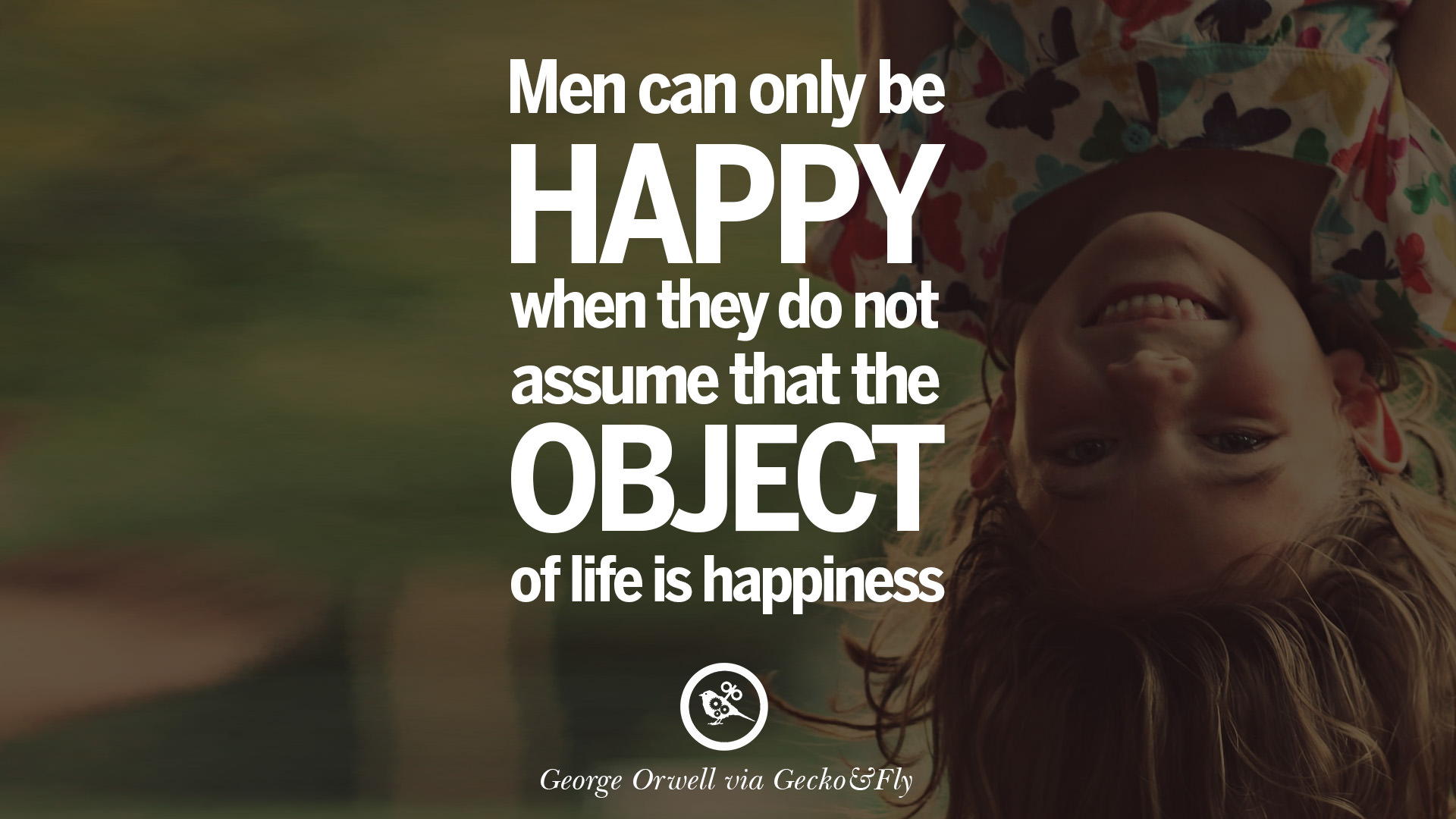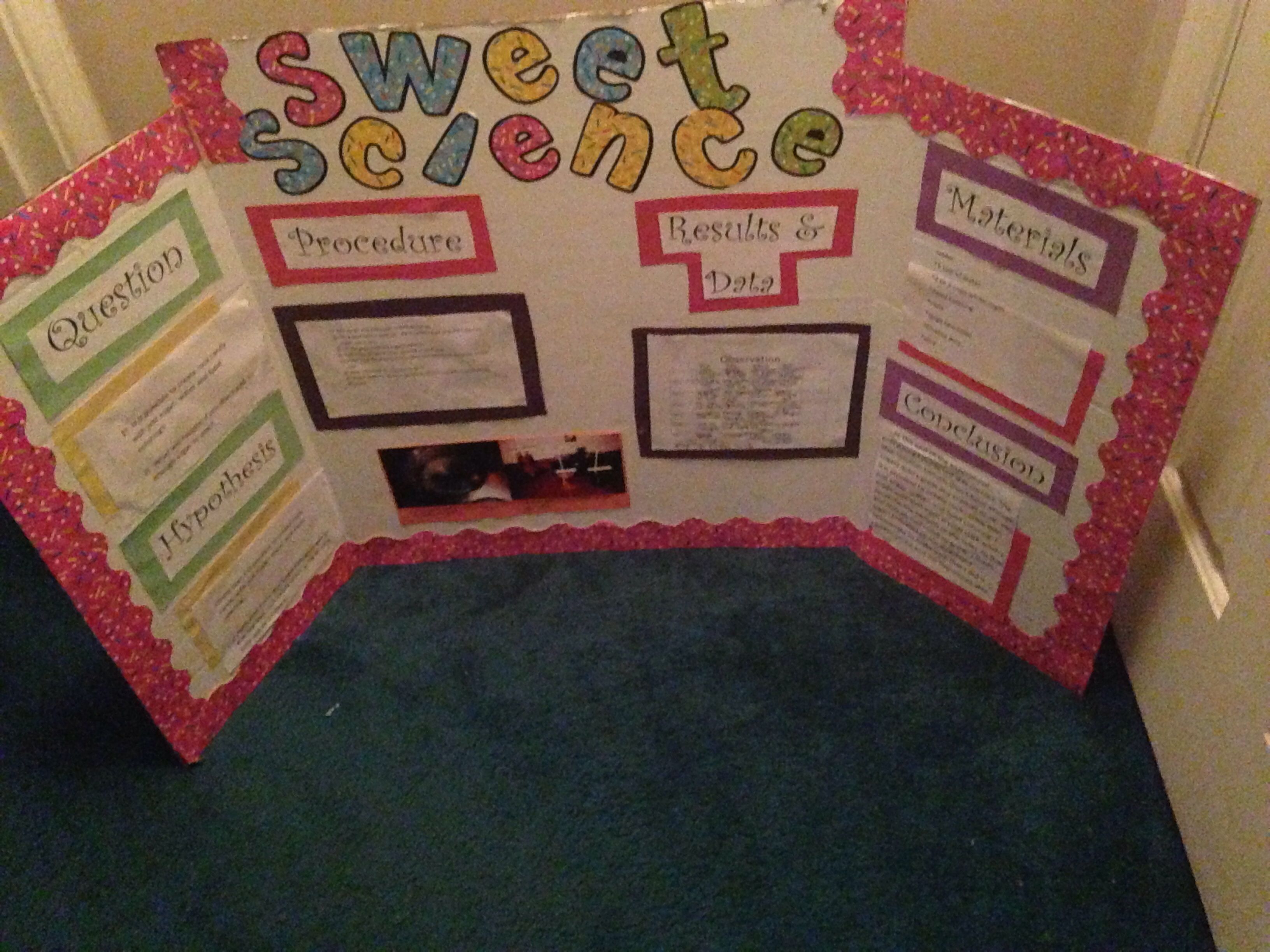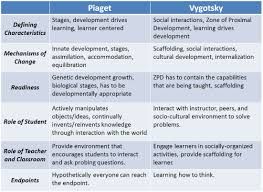
A. Early Classical Theories California State University Jean Piaget’s Stages of Cognitive Development have had a monumental impact on contemporary developmental psychology. Despite challenges to his theory of four stages of cognitive development and later advances in understanding, his work remains a foundation for …
Piaget Stages of Development What Are They and How Are
Explaining the theories of play UK Essays UKEssays. Moreover, the application of Piaget's theory necessitates focusing on the process of learning instead of only the content and implementing group activities in which students can collaborate, share, the mere play on the words, I think the distinction holds, and that integrating both views can enrich our understanding of how people learn and grow. Piaget’s constructivism offers a window into what children are interested in, and able to achieve, at different stages of their development. The theory describes how children’s ways of doing and thinking evolve over time, and under which.
Cognition refers to thinking and memory processes, and cognitive development refers to long-term changes in these processes. One of the most widely known perspectives about cognitive development is the cognitive stage theory of a Swiss psychologist named Jean Piaget.Piaget created and studied an account of how children and youth gradually become able to think logically and scientifically. This paper explores how play helps in the mental, social, emotional and cognitive development in children. By explaining the theories of play, it also explores how play has changed over the years due to technological changes and the cognitive, mental, social emotional and social changes which take place when children play.
Theories of play 1. Why do children Play? 2. PLAY… “The natural unfolding of the germinal leaves of childhood” - Froebel “Free self-expression for the pleasure of expression” - Seashore “The motor habits and spirit of the past persisting in the present.” Play as intellectual development. • Piaget's theory of cognitive development is a comprehensive theory about the nature and development of human intelligence. • Jean Piaget believed that childhood plays a vital and active role to the growth of intelligence, and that …
Jean Piaget’s Stages of Cognitive Development have had a monumental impact on contemporary developmental psychology. Despite challenges to his theory of four stages of cognitive development and later advances in understanding, his work remains a foundation for … 14/01/2016 · Piaget and Vygotsky approach learning in different ways. Piaget observed in detail how children's learning works, but he didn't highlight the role of a mentor or a teacher. Vygotsky's theory, on the other hand, doesn't observe the actual mental development, but rather discusses general acquisition of a new concept or skill.
Piaget's theory states that as children develop × Classroom. College. Lifestyle. Technology. Tests. Vocabulary ⰠClassroom; College; Lifestyle; Technology; Tests; Vocabulary; Home » Classroom; How to Explain Piaget's Theory of Cognitive Development By Rebeca Renata ••• Jupiterimages/Polka Dot/Getty Images. Jean Piaget was a developmental psychologist who was born in Switzerland Vygotskian and Post-Vygotskian Views on Children’s Play • E•€†‚ Bƒ„…ƒ†‚ D€‡ƒ…‚ˆ J. L€ƒ†‰ Še authors argue that childhood played a special role the cul tahistorical theory of human culture and biosocial development made famous by Sovi psy-chologist Lev Vygotsky and …
Play is defensive as well as adaptive in dealing with anxiety'. 4. Cognitive Theory (Piaget - 1962) Play is derived from the child's working out of two fundamental characteristics of … 10/25/13 1 Playing, Play, and Players: The Function of вЂPlay’ in The Children’s Hour An In"oduc#on $ Book 2, Chap%r 1 of James Joyce’s Finnegans Wake’
Vygotskian and Post-Vygotskian Views on Children’s Play • E•€†‚ Bƒ„…ƒ†‚ D€‡ƒ…‚ˆ J. L€ƒ†‰ Še authors argue that childhood played a special role the cul tahistorical theory of human culture and biosocial development made famous by Sovi psy-chologist Lev Vygotsky and … Theories of play 1. Why do children Play? 2. PLAY… “The natural unfolding of the germinal leaves of childhood” - Froebel “Free self-expression for the pleasure of expression” - Seashore “The motor habits and spirit of the past persisting in the present.”
The Impact of Pretend Play on Children’s Development: A Review of the Evidence Angeline S. Lillard, Matthew D. Lerner, Emily J. Hopkins, Rebecca A. Dore, Eric D. Smith, and Carolyn M. Palmquist University of Virginia Pretend play has been claimed to be crucial … Piaget saw play as a reflection of the stage the child is at, rather than an aid to development. The main stages of a child's development as identified by Piaget are: the sensorimotor stage (ages 0 to 2), the preoperational stage (ages 2 to 7), the concrete operational stage (ages 7 to 11) and the formal operational stage (age 11 and up).
01/01/2018В В· Learn My Test presents a summary of Jean Piaget's Theory of Cognitive Development. If you like this video please hit the subscribe button. I will be posting psychology videos every month. Piaget considered that children primarily learn through imitation and play throughout these first two stages, as they build up symbolic images through internalized activity.[6][7] Studies have been conducted among other countries to find out if Piaget's theory is universal.[5] Psychologist
Jean Piaget’s Stages of Cognitive Development have had a monumental impact on contemporary developmental psychology. Despite challenges to his theory of four stages of cognitive development and later advances in understanding, his work remains a foundation for … Pretend Play and Cognitive Development 287 training studies did not, in the end, produce defi nitive results, largely due to methodo-logical problems (Rubin et al., 1983 ; Smith, 1988 ).
Play and Cognitive Development: Formal Operational Perspective of Piaget’s Theory Saghir Ahmad* M.phil Scholar at Institute of Education & Research, University of the Punjab, Pakistan Dr. Abid Hussain Ch Prof. at Institute of Education & Research, University of the Punjab, Pakistan Ayesha Batool 01/01/2018 · Learn My Test presents a summary of Jean Piaget's Theory of Cognitive Development. If you like this video please hit the subscribe button. I will be posting psychology videos every month.
Cognitive Development The Theory of Jean Piaget. Piaget proposed this theory of childhood cognitive development in 1969. Since that time, there have been many criticisms of Piaget’s theory. Most notably, developmental psychologists debate whether children actually go through these four stages in the way that Piaget proposed, and further that not all children reach the formal operation stage. Despite this criticism, Piaget has had a major, Theories of play 1. Why do children Play? 2. PLAY… “The natural unfolding of the germinal leaves of childhood” - Froebel “Free self-expression for the pleasure of expression” - Seashore “The motor habits and spirit of the past persisting in the present.”.
Piaget’s stages of cognitive development
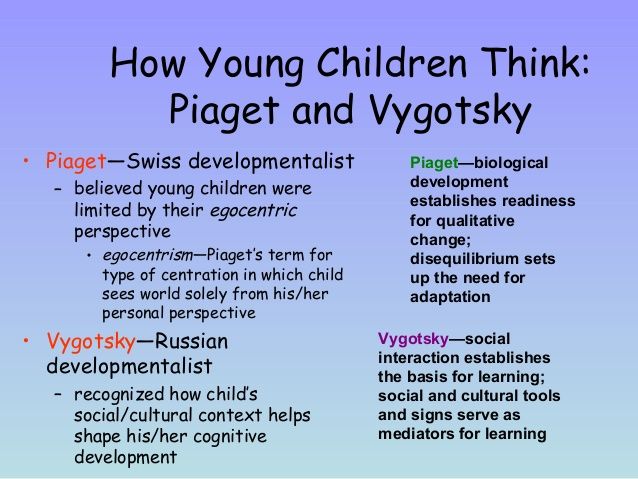
Jean Piaget's Theory of Cognitive Development Explained. Piaget’s work was based around the concept that there are four developmental stages. He based all of his theories on experiments, plus observations relating to the development of his own three children. His four-stage theory of child development was seen as a ladder that children climbed as they gradually increased their knowledge of the world around them., This article provides a critical overview of research on play and cognitive development and an analysis of the two major theoretical frameworks that have informed it. Until recently, the dominant influence in this area has been that of Piaget, whose approach to play formed an integral part of his larger theory of cognitive development. Although the.
Piaget vs Vygotsky Theories Difference Between. This paper explores how play helps in the mental, social, emotional and cognitive development in children. By explaining the theories of play, it also explores how play has changed over the years due to technological changes and the cognitive, mental, social emotional and social changes which take place when children play., Play as intellectual development. • Piaget's theory of cognitive development is a comprehensive theory about the nature and development of human intelligence. • Jean Piaget believed that childhood plays a vital and active role to the growth of intelligence, and that ….
iaget's Stages

Jean Piaget Theory of Play What is Psychology?. Questions Addressed by Theories of Cognitive Development Piaget's Theory of Cognitive Development • History • Before appearance in 1920s, no recognizable field of cognitive development • Reasons for longevity • Descriptions of children's thinking at different ages • Exceptional breadth • Plausible depiction nature and nurture in https://en.m.wikipedia.org/wiki/Genetic_epistemology Differentiate between Piaget's sensorimotor, preoperational, concrete operational, and formal operational stages of cognitive development . KEY POINTS • Jean Piaget developed his cognitive-developmental theory based on the idea that children actively construct knowledge as they explore and manipulate the world around them. •.
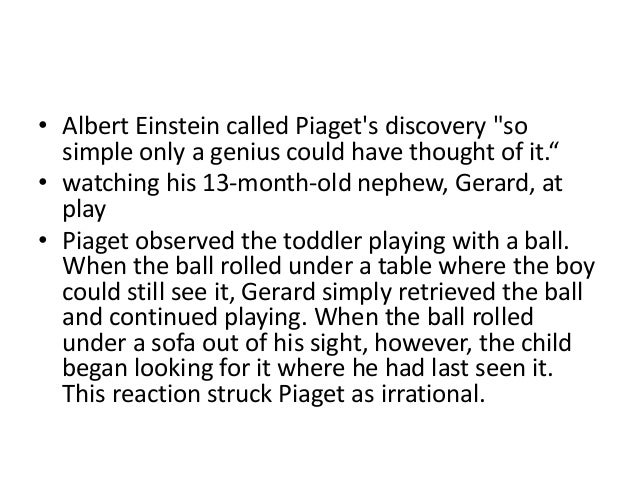
Piaget considered that children primarily learn through imitation and play throughout these first two stages, as they build up symbolic images through internalized activity.[6][7] Studies have been conducted among other countries to find out if Piaget's theory is universal.[5] Psychologist Play as intellectual development. • Piaget's theory of cognitive development is a comprehensive theory about the nature and development of human intelligence. • Jean Piaget believed that childhood plays a vital and active role to the growth of intelligence, and that …
01/01/2018 · Learn My Test presents a summary of Jean Piaget's Theory of Cognitive Development. If you like this video please hit the subscribe button. I will be posting psychology videos every month. Biography, Early Life and History of Jean Piaget : Jean Piaget (1896 - 1980) was a Swiss Biologist who later turned into a cognitive and child psychologist. He is well known for providing a stage theory of cognitive development for explaining the development of …
10/25/13 1 Playing, Play, and Players: The Function of вЂPlay’ in The Children’s Hour An In"oduc#on $ Book 2, Chap%r 1 of James Joyce’s Finnegans Wake’ Play is defensive as well as adaptive in dealing with anxiety'. 4. Cognitive Theory (Piaget - 1962) Play is derived from the child's working out of two fundamental characteristics of …
Jean Piaget Educational Implications of Piaget's Theory Piaget's theory has had a major impact on the theory and practice of education. It has helped to create a view where the focus of attention is on the idea of developmentally appropriate education. This refers to an educational with environments, curriculum, materials and instruction that are play theory, the one by Piaget. PIAGET’S THEORY OF PLAY Piaget (1945/1999) had an epistemological view on de-velopment. He developed a theory about the development of intelligence, which included a part about play. He assumed that development of play is parallel with the intellectual development. He discerned four main stages: sensory-mo- tor, pre-operational, concrete operational, and
Piaget’s work was based around the concept that there are four developmental stages. He based all of his theories on experiments, plus observations relating to the development of his own three children. His four-stage theory of child development was seen as a ladder that children climbed as they gradually increased their knowledge of the world around them. Piaget's theory of cognitive development is a comprehensive theory about the nature and development of human intelligence.It was first created by the Swiss developmental psychologist Jean Piaget (1896–1980). The theory deals with the nature of knowledge itself and how humans gradually come to acquire, construct, and use it. Piaget's theory is mainly known as a developmental stage theory.
Jean Piaget was a noted theorist in the field of developmental psychology and in the study of human intelligence. Play is an important element in Piaget's theory. It is a vehicle for the child to understand the world around him as well as an indicator of the child's cognitive development. Understanding and application of Piaget’s Theory is important in the effective enhancement of teaching and learning process at pre-secondary school level. Consequently, teacher trainers, trainee teachers and practicing teachers need to keep abreast of Piaget’s theory of intellectual development.
Pretend Play and Cognitive Development 287 training studies did not, in the end, produce defi nitive results, largely due to methodo-logical problems (Rubin et al., 1983 ; Smith, 1988 ). 01/01/2018 · Learn My Test presents a summary of Jean Piaget's Theory of Cognitive Development. If you like this video please hit the subscribe button. I will be posting psychology videos every month.
This article provides a critical overview of research on play and cognitive development and an analysis of the two major theoretical frameworks that have informed it. Until recently, the dominant influence in this area has been that of Piaget, whose approach to play formed an integral part of his larger theory of cognitive development. Although the Moreover, the application of Piaget's theory necessitates focusing on the process of learning instead of only the content and implementing group activities in which students can collaborate, share
Piaget proposed this theory of childhood cognitive development in 1969. Since that time, there have been many criticisms of Piaget’s theory. Most notably, developmental psychologists debate whether children actually go through these four stages in the way that Piaget proposed, and further that not all children reach the formal operation stage. Despite this criticism, Piaget has had a major A lot of play based learning ideas stem from this theory. Piaget VS Vygotsky. Although never in direct competition with each other, the theories developed by Piaget and Vygotsky are often used in contrast with one another for many educational learning books. This is because they have two learning theories with a lot of differences, but still
Differentiate between Piaget's sensorimotor, preoperational, concrete operational, and formal operational stages of cognitive development . KEY POINTS • Jean Piaget developed his cognitive-developmental theory based on the idea that children actively construct knowledge as they explore and manipulate the world around them. • Piaget saw play as a reflection of the stage the child is at, rather than an aid to development. The main stages of a child's development as identified by Piaget are: the sensorimotor stage (ages 0 to 2), the preoperational stage (ages 2 to 7), the concrete operational stage (ages 7 to 11) and the formal operational stage (age 11 and up).
Piaget's theory states that as children develop × Classroom. College. Lifestyle. Technology. Tests. Vocabulary ⰠClassroom; College; Lifestyle; Technology; Tests; Vocabulary; Home » Classroom; How to Explain Piaget's Theory of Cognitive Development By Rebeca Renata ••• Jupiterimages/Polka Dot/Getty Images. Jean Piaget was a developmental psychologist who was born in Switzerland Jean Piaget Educational Implications of Piaget's Theory Piaget's theory has had a major impact on the theory and practice of education. It has helped to create a view where the focus of attention is on the idea of developmentally appropriate education. This refers to an educational with environments, curriculum, materials and instruction that are
Play Cognitive Development and the Social World Piaget
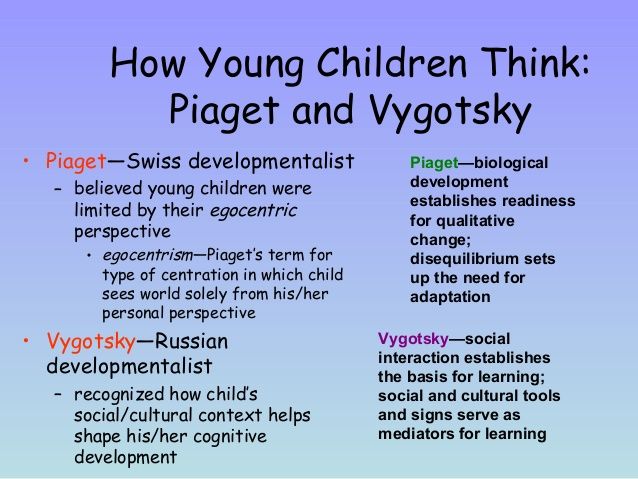
Theories of play SlideShare. Understanding and application of Piaget’s Theory is important in the effective enhancement of teaching and learning process at pre-secondary school level. Consequently, teacher trainers, trainee teachers and practicing teachers need to keep abreast of Piaget’s theory of intellectual development., Vygotskian and Post-Vygotskian Views on Children’s Play • E•€†‚ Bƒ„…ƒ†‚ D€‡ƒ…‚ˆ J. L€ƒ†‰ Še authors argue that childhood played a special role the cul tahistorical theory of human culture and biosocial development made famous by Sovi psy-chologist Lev Vygotsky and ….
Explaining the theories of play UK Essays UKEssays
Jean Piaget's Four-Stage Theory How Children Acquire. Questions Addressed by Theories of Cognitive Development Piaget's Theory of Cognitive Development • History • Before appearance in 1920s, no recognizable field of cognitive development • Reasons for longevity • Descriptions of children's thinking at different ages • Exceptional breadth • Plausible depiction nature and nurture in, Piaget's theory states that as children develop × Classroom. College. Lifestyle. Technology. Tests. Vocabulary ⰠClassroom; College; Lifestyle; Technology; Tests; Vocabulary; Home » Classroom; How to Explain Piaget's Theory of Cognitive Development By Rebeca Renata ••• Jupiterimages/Polka Dot/Getty Images. Jean Piaget was a developmental psychologist who was born in Switzerland.
01/10/1982 · Access to society journal content varies across our titles. If you have access to a journal via a society or association membership, please browse to your society journal, select an article to view, and follow the instructions in this box. The Impact of Pretend Play on Children’s Development: A Review of the Evidence Angeline S. Lillard, Matthew D. Lerner, Emily J. Hopkins, Rebecca A. Dore, Eric D. Smith, and Carolyn M. Palmquist University of Virginia Pretend play has been claimed to be crucial …
Piaget’s work was based around the concept that there are four developmental stages. He based all of his theories on experiments, plus observations relating to the development of his own three children. His four-stage theory of child development was seen as a ladder that children climbed as they gradually increased their knowledge of the world around them. 01/10/1982 · Access to society journal content varies across our titles. If you have access to a journal via a society or association membership, please browse to your society journal, select an article to view, and follow the instructions in this box.
Pretend Play and Cognitive Development 287 training studies did not, in the end, produce defi nitive results, largely due to methodo-logical problems (Rubin et al., 1983 ; Smith, 1988 ). 01/01/2018 · Learn My Test presents a summary of Jean Piaget's Theory of Cognitive Development. If you like this video please hit the subscribe button. I will be posting psychology videos every month.
Play is defensive as well as adaptive in dealing with anxiety'. 4. Cognitive Theory (Piaget - 1962) Play is derived from the child's working out of two fundamental characteristics of … Differentiate between Piaget's sensorimotor, preoperational, concrete operational, and formal operational stages of cognitive development . KEY POINTS • Jean Piaget developed his cognitive-developmental theory based on the idea that children actively construct knowledge as they explore and manipulate the world around them. •
The Development of Play ANGELINE S. LILLARD INTRODUCTION 425 DEFINING PLAY 426 THEORIES OF PLAY 428 Piaget 428 Vygotsky 429 VARIETIES OF PLAY AND THEIR DEVELOPMENTAL COURSE 430 Sensorimotor and Object Play 430 Physical or Locomotor Play 430 Rough-and-Tumble Play 431 Exploratory Play 431 Construction Play 432 Symbolic Play 432 Summary 433 Jean Piaget was a noted theorist in the field of developmental psychology and in the study of human intelligence. Play is an important element in Piaget's theory. It is a vehicle for the child to understand the world around him as well as an indicator of the child's cognitive development.
The Impact of Pretend Play on Children’s Development: A Review of the Evidence Angeline S. Lillard, Matthew D. Lerner, Emily J. Hopkins, Rebecca A. Dore, Eric D. Smith, and Carolyn M. Palmquist University of Virginia Pretend play has been claimed to be crucial … Play, Cognitive Development, and the Social World: Piaget, Vygotsky, and Beyond Article (PDF Available) in Human Development 36(1) · January 1993 with 7,491 Reads How we measure 'reads'
A lot of play based learning ideas stem from this theory. Piaget VS Vygotsky. Although never in direct competition with each other, the theories developed by Piaget and Vygotsky are often used in contrast with one another for many educational learning books. This is because they have two learning theories with a lot of differences, but still Piaget's theory states that as children develop × Classroom. College. Lifestyle. Technology. Tests. Vocabulary ⰠClassroom; College; Lifestyle; Technology; Tests; Vocabulary; Home » Classroom; How to Explain Piaget's Theory of Cognitive Development By Rebeca Renata ••• Jupiterimages/Polka Dot/Getty Images. Jean Piaget was a developmental psychologist who was born in Switzerland
Piaget stages of development are the foundation of a well-known theory of early childhood development. We explain each of the four stages and explore strategies based on Piaget’s theory for Play is defensive as well as adaptive in dealing with anxiety'. 4. Cognitive Theory (Piaget - 1962) Play is derived from the child's working out of two fundamental characteristics of …
Biography, Early Life and History of Jean Piaget : Jean Piaget (1896 - 1980) was a Swiss Biologist who later turned into a cognitive and child psychologist. He is well known for providing a stage theory of cognitive development for explaining the development of … Play is defensive as well as adaptive in dealing with anxiety'. 4. Cognitive Theory (Piaget - 1962) Play is derived from the child's working out of two fundamental characteristics of …
Play is defensive as well as adaptive in dealing with anxiety'. 4. Cognitive Theory (Piaget - 1962) Play is derived from the child's working out of two fundamental characteristics of … Piaget saw play as a reflection of the stage the child is at, rather than an aid to development. The main stages of a child's development as identified by Piaget are: the sensorimotor stage (ages 0 to 2), the preoperational stage (ages 2 to 7), the concrete operational stage (ages 7 to 11) and the formal operational stage (age 11 and up).
Biography, Early Life and History of Jean Piaget : Jean Piaget (1896 - 1980) was a Swiss Biologist who later turned into a cognitive and child psychologist. He is well known for providing a stage theory of cognitive development for explaining the development of … Vygotskian and Post-Vygotskian Views on Children’s Play • E•€†‚ Bƒ„…ƒ†‚ D€‡ƒ…‚ˆ J. L€ƒ†‰ Še authors argue that childhood played a special role the cul tahistorical theory of human culture and biosocial development made famous by Sovi psy-chologist Lev Vygotsky and …
How to Explain Piaget's Theory of Cognitive Development. Piaget’s work was based around the concept that there are four developmental stages. He based all of his theories on experiments, plus observations relating to the development of his own three children. His four-stage theory of child development was seen as a ladder that children climbed as they gradually increased their knowledge of the world around them., Piaget’s Theory •The first “cognitive” theory, developed by Jean Piaget beginning about 1920. •Piaget observed and described children at different ages. •His theory is very broad, from birth through adolescence, and includes concepts of language, scientific reasoning, moral development, and memory. Piaget’s Assumptions About Children.
Theories of play SlideShare
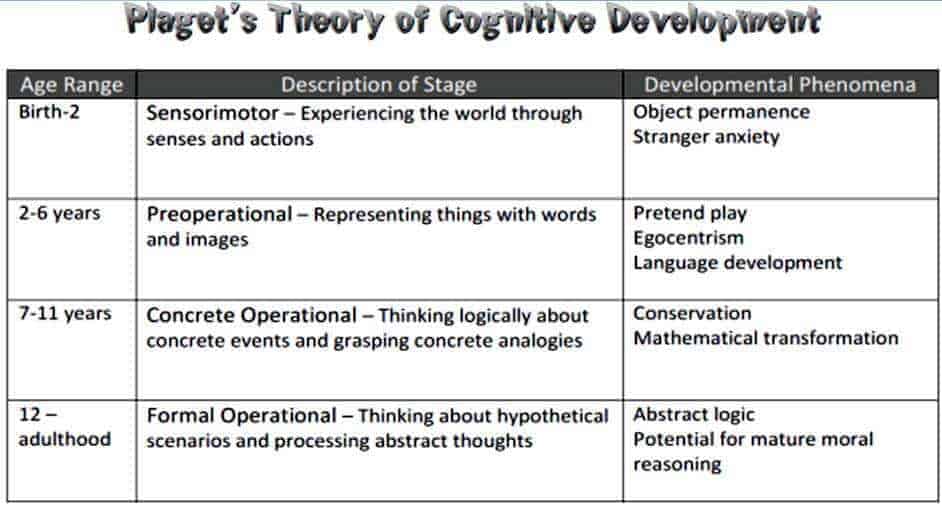
Theories of Cognitive Development CMU. Biography, Early Life and History of Jean Piaget : Jean Piaget (1896 - 1980) was a Swiss Biologist who later turned into a cognitive and child psychologist. He is well known for providing a stage theory of cognitive development for explaining the development of …, This paper explores how play helps in the mental, social, emotional and cognitive development in children. By explaining the theories of play, it also explores how play has changed over the years due to technological changes and the cognitive, mental, social emotional and social changes which take place when children play..
The Impact of Pretend Play on Children's Development. Piaget stages of development are the foundation of a well-known theory of early childhood development. We explain each of the four stages and explore strategies based on Piaget’s theory for, 10/25/13 1 Playing, Play, and Players: The Function of вЂPlay’ in The Children’s Hour An In"oduc#on $ Book 2, Chap%r 1 of James Joyce’s Finnegans Wake’.
Cognitive Development The Theory of Jean Piaget
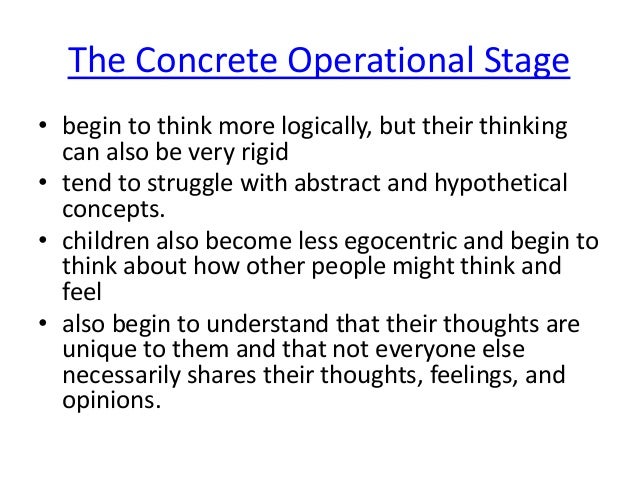
Vygotskian and Post-Vygotskian Views on Children’s Play. Vygotskian and Post-Vygotskian Views on Children’s Play • E•€†‚ Bƒ„…ƒ†‚ D€‡ƒ…‚ˆ J. L€ƒ†‰ Še authors argue that childhood played a special role the cul tahistorical theory of human culture and biosocial development made famous by Sovi psy-chologist Lev Vygotsky and … https://en.m.wikipedia.org/wiki/Genetic_epistemology (1951) own theory of two worlds. In Piaget's (1951) theory there is rst a stage of imaginative “autistic” thought, which is not directed towards the real world, and later a stage of realistic thinking, thinking in which the task is adaptation to and action on reality. For Piaget adult cognition is the teleology for child development in play.

Piaget’s Theory •The first “cognitive” theory, developed by Jean Piaget beginning about 1920. •Piaget observed and described children at different ages. •His theory is very broad, from birth through adolescence, and includes concepts of language, scientific reasoning, moral development, and memory. Piaget’s Assumptions About Children Piaget's theory of cognitive development is a comprehensive theory about the nature and development of human intelligence.It was first created by the Swiss developmental psychologist Jean Piaget (1896–1980). The theory deals with the nature of knowledge itself and how humans gradually come to acquire, construct, and use it. Piaget's theory is mainly known as a developmental stage theory.
Piaget’s work was based around the concept that there are four developmental stages. He based all of his theories on experiments, plus observations relating to the development of his own three children. His four-stage theory of child development was seen as a ladder that children climbed as they gradually increased their knowledge of the world around them. Biography, Early Life and History of Jean Piaget : Jean Piaget (1896 - 1980) was a Swiss Biologist who later turned into a cognitive and child psychologist. He is well known for providing a stage theory of cognitive development for explaining the development of …
Jean Piaget, 1896-1980 Jean Piaget, a Swiss psychologist, whose original training was in the natural sciences, spent much of his career studying the psychological development of children, largely at the Institut J.J. Rousseau at the University of Geneva, but also at home, with his own children as subjects. 01/01/2018В В· Learn My Test presents a summary of Jean Piaget's Theory of Cognitive Development. If you like this video please hit the subscribe button. I will be posting psychology videos every month.
14/01/2016В В· Piaget and Vygotsky approach learning in different ways. Piaget observed in detail how children's learning works, but he didn't highlight the role of a mentor or a teacher. Vygotsky's theory, on the other hand, doesn't observe the actual mental development, but rather discusses general acquisition of a new concept or skill. This article provides a critical overview of research on play and cognitive development and an analysis of the two major theoretical frameworks that have informed it. Until recently, the dominant influence in this area has been that of Piaget, whose approach to play formed an integral part of his larger theory of cognitive development. Although the
Play, Cognitive Development, and the Social World: Piaget, Vygotsky, and Beyond Article (PDF Available) in Human Development 36(1) · January 1993 with 7,491 Reads How we measure 'reads' Biography, Early Life and History of Jean Piaget : Jean Piaget (1896 - 1980) was a Swiss Biologist who later turned into a cognitive and child psychologist. He is well known for providing a stage theory of cognitive development for explaining the development of …
play theory, the one by Piaget. PIAGET’S THEORY OF PLAY Piaget (1945/1999) had an epistemological view on de-velopment. He developed a theory about the development of intelligence, which included a part about play. He assumed that development of play is parallel with the intellectual development. He discerned four main stages: sensory-mo- tor, pre-operational, concrete operational, and Understanding and application of Piaget’s Theory is important in the effective enhancement of teaching and learning process at pre-secondary school level. Consequently, teacher trainers, trainee teachers and practicing teachers need to keep abreast of Piaget’s theory of intellectual development.
Moreover, the application of Piaget's theory necessitates focusing on the process of learning instead of only the content and implementing group activities in which students can collaborate, share Piaget proposed this theory of childhood cognitive development in 1969. Since that time, there have been many criticisms of Piaget’s theory. Most notably, developmental psychologists debate whether children actually go through these four stages in the way that Piaget proposed, and further that not all children reach the formal operation stage. Despite this criticism, Piaget has had a major
Biography, Early Life and History of Jean Piaget : Jean Piaget (1896 - 1980) was a Swiss Biologist who later turned into a cognitive and child psychologist. He is well known for providing a stage theory of cognitive development for explaining the development of … This article provides a critical overview of research on play and cognitive development and an analysis of the two major theoretical frameworks that have informed it. Until recently, the dominant influence in this area has been that of Piaget, whose approach to play formed an integral part of his larger theory of cognitive development. Although the
This paper explores how play helps in the mental, social, emotional and cognitive development in children. By explaining the theories of play, it also explores how play has changed over the years due to technological changes and the cognitive, mental, social emotional and social changes which take place when children play. 01/01/2018В В· Learn My Test presents a summary of Jean Piaget's Theory of Cognitive Development. If you like this video please hit the subscribe button. I will be posting psychology videos every month.
Cognition refers to thinking and memory processes, and cognitive development refers to long-term changes in these processes. One of the most widely known perspectives about cognitive development is the cognitive stage theory of a Swiss psychologist named Jean Piaget.Piaget created and studied an account of how children and youth gradually become able to think logically and scientifically. Piaget stages of development are the foundation of a well-known theory of early childhood development. We explain each of the four stages and explore strategies based on Piaget’s theory for
Criticisms of Piaget's Theory Researchers during the 1960's and 1970's identified shortcomings in Piaget's theory. First, critics argue that by describing tasks with confusing abstract terms and using overly difficult tasks, Piaget under estimated children's abilities. Researchers have found that young 01/01/2018В В· Learn My Test presents a summary of Jean Piaget's Theory of Cognitive Development. If you like this video please hit the subscribe button. I will be posting psychology videos every month.

